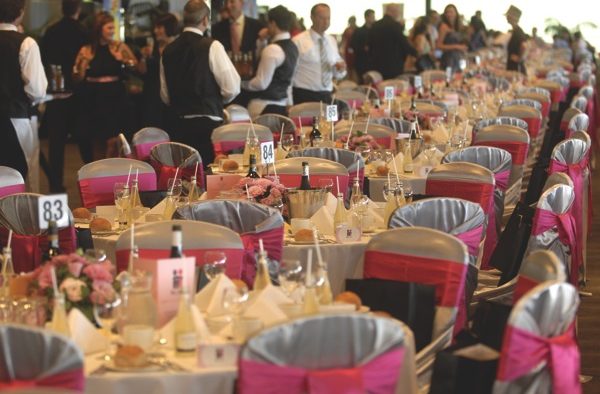Rosehill Gardens Event Centre has grown to become one of Sydney’s premier event venues, with a reputation for excellent catering produced by its experienced team of in-house chefs.
The centre recently won the 2009 National ‘Meetings & Events Australia Banqueting & Catering’ Award, its latest in a string of catering accolades.
Should catering inform the decision of where to hold an event?
If a specific location such as a beachside wedding reception or a rainforest eco conference is not a factor – then absolutely.
The food and beverage experience is often the only personal aspect a guest takes from an event and the attention to detail that is paid to catering is a reflection of the entire venue’s operation.
Why is it important to have good catering at an event?
Every event, from a working style luncheon to a large five-course banquet, consists of an array of elements that deem it a success. However, if just one of these components is of poor quality, the success of the entire event can be perceived negatively by guests. The food experience and service delivery is of high importance to clients and is crucial to staging a successful event.
What do you consider to be the components of good catering?
Good catering relies on a number of components, including:
- Sourcing the freshest possible ingredients
- Food presentation, and serving it at the correct temperature
- An adequate quantity of food and a suitable menu for the demographic/style of event
- Professional, skilled, well presented and pleasant staff
- The ability to cater for special diets and allergy requirements
- The ability to advise, assist and direct clients to ensure the best possible guest experience
- Being proud and passionate about the product you’re delivering.
How important is it to continuously be ‘innovative’ or ‘original’?
Innovation is what separates an average caterer from a great caterer. Clever food combinations, serving styles, modern glassware and tableware all add to the guests’ experience.
Classic dishes with a ‘twist’ can put a modern spin on an old favourite. Unless you are specifically in the market of ‘experimental food’ or ‘food science’, most events do require some classic components (e.g. chicken breast or beef fillet) to maintain a balance and to cater for broad audiences.
What information should organisations provide to caterers when planning an event?
There is never too much information a client can provide a venue. Apart from vital information such as the number of guests, menu selection and service times, the following details are important:
- Special dietary requirements and in advance, if possible, where these guests are seated
- Location of VIPs, sponsors, officials, cameras, projectors or any other ‘special’ areas
- The staff to guest ratio
- Any patrons under the age of 18
- Any unforseen costs or last-minute changes, including surprise entertainment
- Religious or cultural issues that may arise
- Occupational health and safety issues that may arise.
What are some tips/strategies for incorporating unusual or specific catering requests?
Comprehensive checklist – Have a checklist available with all of the above points and ensure that each point is addressed and communicated. Also ensure that customer feedback from previous events is available, and that any points of concern are addressed and incorporated in pre-planning and event delivery.
Maintaining relationships – It is so beneficial to maintain plenty of industry contacts, especially those in close proximity to your venue – you never know when you may need to borrow a resource or ‘pick a brain’. Maintaining great supplier relationships to assist with unusual and last minute requests is also advantageous.
Capable staff – The most critical component is to employ staff with a ‘can do’ attitude to ensure the product and delivery are flawless.
















































































































































